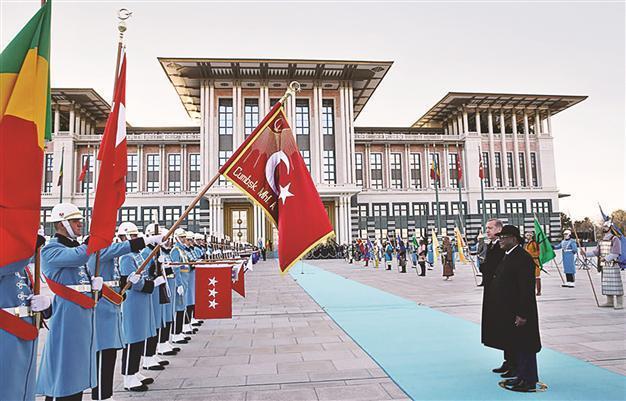1,150 policemen stand guard at Turkey's presidential palace
Fevzi Kızılkoyun ANKARA
 A total of 1,150 policemen stand guard at Turkey’s newly built 1,150-room presidential palace, which has caused debates with its humongous size and cost.
A total of 1,150 policemen stand guard at Turkey’s newly built 1,150-room presidential palace, which has caused debates with its humongous size and cost. Some 50 million Turkish Liras were spent on the high-tech security system of the palace, which is frequently praised by President Recep Tayyip Erdoğan, according to sources.
The policemen, who more than double the 450 guards at former presidential palace Çankaya in number, are on duty 24 hours, both inside the palace and outside the courtyard, as it is located inside a forested area in the capital city of Ankara and has a fence surrounding about five kilometers. Some 3,000 surveillance cameras help oversee this area, demanding a huge investment in equipment and the infrastructure to control it.
The palace is decorated with devices that take measures against any possibility of wiretapping. Erdoğan, along with many leading state figures, was tapped in 2013, as a case on bugs found in his office while he was prime minister is still continuing.
The palace’s power expenses have been a recent issue of debate with main opposition Republican People’s Party (CHP) deputy Ali Demirçalı claiming on Feb. 14 that the palace consumed nearly 1,150 million liras-worth electricity in one month. Showing an electricity bill, the deputy also said the palace was fined nearly 107,000 liras for delay in payment.
Erdoğan has reportedly ordered a block of the already-expensive palace to be rebuilt so it can host concerts and similar events, according to a Feb. 10 report by daily Evrensel. A horse farm, which was also not present in the initial plan, is expected to be built soon, according to the report.
A leading architect in Ankara has claimed the ‘“The staff of the palace is likely to suffer from sick building syndrome” due to “dense magnetism.”
“The staff of the palace is likely to suffer from sick building syndrome, both physically and psychologically, due to an area of dense magnetism,” Tezcan Karakuş Candan, the local head of the Chamber of Architects and Engineers’ (TMMOB) told daily Hürriyet on Feb. 9.
Opposition parties insist that the palace is an unlicensed construction.
Turkey’s Constitutional Court last year dismissed several appeals claiming the illegality of the palace, prompting one of the applicants, the head of the Ankara branch of the Chamber of Architects, to take the case to the European Court of Human Rights (ECHR).
















